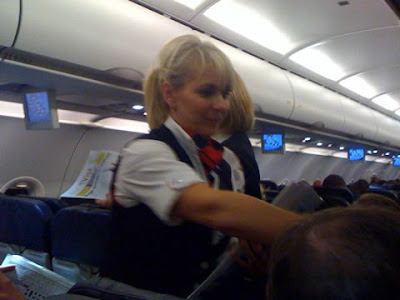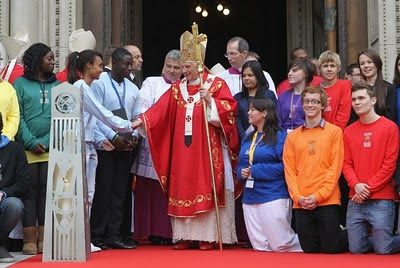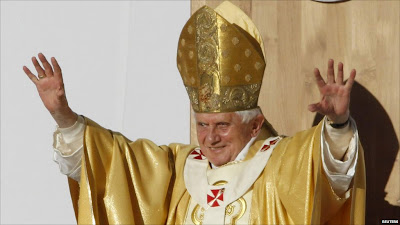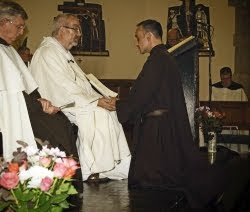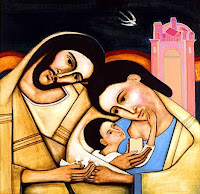
With an expectation-surpassing UK Papal visit in the books and this recovery week at its end, British Catholicism's twin pillars of the ecclesial conversation have sent up their impressions of the surprising, memorable, triumphant four-day trek in their leading articles.
In that light, as we did in the run-up to B16's unprecedented state visit, let's take a look at both weeklies' top editorials.
First, today's leader from an elated Catholic Herald:
Benedict XVI exposed the heart of the Catholic faith
We owe him our deepest gratitude. His visit was as great a success as that of John Paul II in 1982
The first reaction of Catholics to the visit of Pope Benedict XVI to these shores must be to thank God for its extraordinary success. By the end of the triumphant first day in Scotland, it was clear that the British people were in a mood to listen to the Pope, and that excitement at his presence was bursting out in the most unlikely places. As our guest flew to London, Catholics prayed that the momentum could be sustained. In the event, it was not just sustained but continued to build. Every occasion added new significance to the visit.
In Westminster Hall, the Holy Father asked searching questions that exposed the emptiness of secularism. In Westminster Abbey, his presence seemed to revitalise that ancient building – and his Anglican listeners, too, as they realised how much their Christian witness is valued by the successor of St Peter. In Westminster Cathedral, the Pope acknowledged clearly and with shame the dreadful acts committed by clergy and religious against children; he had done so before, but his decision to do so in the context of a solemn liturgy underlined the abominable insult to the sacrifice of Christ represented by those crimes. In Hyde Park, the Pope literally exposed the heart of the Catholic faith to crowds of thousands and a television audience of millions: very deliberately, he directed our attention away from himself and towards the Blessed Sacrament. In Birmingham, he beatified John Henry Newman, personally raising to the altars a son of the Church for the first time in his pontificate. In doing so, he quoted Blessed Cardinal Newman: “I want a laity, not arrogant, not rash in speech, not disputatious, but men who know their religion, who enter into it, who know just where they stand, who know what they hold and what they do not, who know their creed so well that they can give an account of it, who know so much of history that they can defend it.”
By this visit Benedict XVI equipped us to become that laity. He was an example to priests, too, in showing how the Ordinary Form of the Roman Rite can be gloriously celebrated. How fitting it would be if, from now on, priests everywhere were to follow the Holy Father’s example of facing a crucifix at Mass, thus properly orientating the celebrant towards Calvary. And, crucially, the Pope set a further example to non-believers, of a great religious leader who radiated love, communicated by his winning little smile as well as by his words. From now on, militant secularists will find it very hard to sustain their odious caricature of Joseph Ratzinger: these were a terrible four days for anti-Catholicism.
We offer our heartfelt thanks to the Catholic organizers of the visit, and also to the Queen and her Government for their hospitality: given the immense difficulties that threatened to derail everything, truly we can say that victory was snatched from the jaws of defeat. But the person who deserves our deepest gratitude is Pope Benedict, who ensured that this visit was – albeit in a very different way – as great a success as that of Pope John Paul II in 1982. Holy Father, we are missing you already.
...and the first line from tomorrow's edition of a no-less-pleased Tablet:
Visit lays a new foundation
To say of Pope Benedict XVI that “he came, he saw, he conquered” would be true, even spectacularly so – but still only part of the truth. For he was conquered too during his state visit to Britain, as he seemed to admit in his Wednesday general audience this week when he spoke of “the intense and very beautiful four days” in which he found the Christian faith strong in every level of society.
The visit had been preceded by vehement and sometimes malicious personal attacks, and while Pope Benedict spoke politely during the plane trip from Rome of Britain as a tolerant society, there was a nervousness in the Vatican about what was perceived as its aggressive secularism – as Cardinal Walter Kasper so dramatically articulated in a German magazine just before the visit.
What the Pope and his entourage actually found is well reflected in the figures confirmed by the Metropolitan Police after Saturday’s events in London. The enthusiastic crowds who lined the streets to watch him pass on his way down the flag-lined Mall grew to 200,000 while there were 6,000 on the anti-papal march to Downing Street, although the organisers claimed that it was several times that figure. Even those parts of the national media that had been most critical of the visit beforehand, had changed their tune by the time he left.
The Pope’s response to Britain has been greatly influenced by Britain’s response to him and that was due in no small part to his preparation for the visit, as well as his demeanour. While there had been apprehension about the country, Pope Benedict turned his formidable intellect to the question of what makes Britain tick, and the subtle and complex nuances of British society and history were both understood and appreciated and in many respects applauded. It was recognition of this that earned his address in Westminster Hall, arguably the centre piece of the entire visit, such a warm reception. The questions he raised were real and telling, and stood at the heart of political debate. He was asking for a new and constructive way for faith and secular society to work together, which he called a conversation. It struck the right note. It threatened nobody’s rights and privileges. It was plausible, even, to begin to see how the Pope might take Britain as a template for the rest of Europe, as to how faith and reason, Church and State, secularism and religion, might after all be good for one another.
At the Hyde Park rally British Catholicism set out its stall, saying simply, “Here we are, this is what we do.” It displayed its diversity, its contributions to the common good through its care for disabled and elderly people and for the education and welfare for young people, its inclusive concern for immigrants, strangers and refugees, its commitment to international development and to protecting the environment. This is precisely what the Pope, writing as Cardinal Ratzinger, once called a “creative minority”; and it is, as Chief Rabbi Lord Sacks said afterwards, a display of post-Constantinian Catholicism that eschews political power in order to stand, as the prophets of old had stood, alongside the powerless.
What happens locally also happens internationally. The Pope’s visit to Britain came on the eve of the summit in New York where world leaders are assembled to discuss progress towards the Millennium Development Goals (MDGs), a project to which successive British governments (and successive Popes) have been fully committed. Britain is already one of the largest sources of international aid and development, proportionately larger than any other G8 nation, and will be the first of that group to reach the longstanding target 0.7 per cent of GDP, in 2013. Italy managed only 0.15 per cent. Those same British Governments have recognised in the Holy See a key partner on the international stage on issues such as the MDGs, not because of wealth or might but because of its wisdom and influence. Pope Benedict said at his general audience on Wednesday that the state visit marked an important new phase in relations between Britain and the Holy See. Those relations matter not just to the people of Britain but to the poor of the world for whom the MDGs are designed to help secure a safer, sustainable and better educated future.
Not to be missed from the journal of record's pages: the wrap-up of the paper's venerable Rome correspondent, Robert Mickens, who covered the days from within the Vatican press-pool.
Among other nuggets in Hammersmith's 56-page commemorative issue: a report that the UK church's hotline for inquiries to convert was flooded with "hundreds" of calls and e.mails during and since the visit... and what's more, such are the hopes of the "Benedict bounce" that the Scottish bishops are already eyeing a potential reopening of Scotus College -- the last seminary on Northern soil until it closed its doors last year.
To mark the first observance of the feast of the country's newly-Blessed "kindly light," Archbishop Vincent Nichols will celebrate a Mass of Thanksgiving for the visit's success in Westminster Cathedral on the freshly-decreed Newmanmas, 9 October.
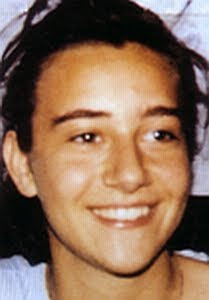 Chiara Badano, a young member of the Focolare movement, who died of bone cancer in 1990, at the age of 18, was beatified on the 25th September by Archbishop Angelo Amato, at the Shrine of Divine Love in Rome.
Chiara Badano, a young member of the Focolare movement, who died of bone cancer in 1990, at the age of 18, was beatified on the 25th September by Archbishop Angelo Amato, at the Shrine of Divine Love in Rome. 
